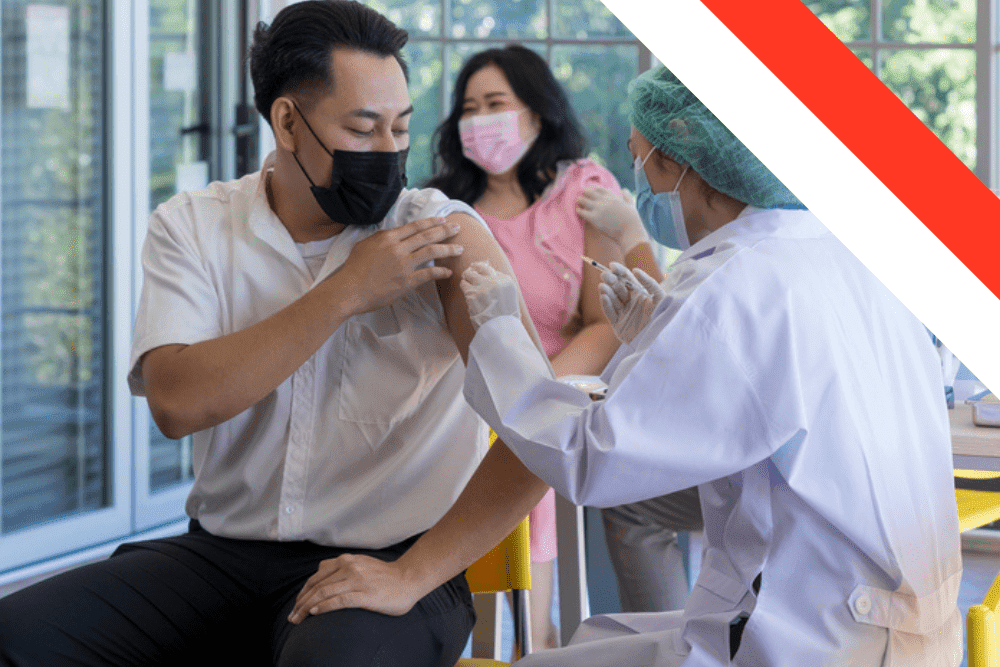The Indonesian Society of Internal Medicine (PAPDI) has unveiled a significant update to its adult vaccination recommendations for 2024, marking a major stride towards fortifying public health in Indonesia and across Asia.
This update represents a crucial step in the ongoing battle against infectious diseases, a challenge that disproportionately affects developing regions. The centrepiece of this update is the introduction of the 15-valent pneumococcal conjugate vaccine (PCV15), offering a powerful new weapon in the fight against pneumonia, a leading cause of respiratory illness.
“Vaccination remains a cornerstone of public health initiatives, protecting individuals and communities from preventable diseases,” stressed Professor Dr Sally Aman Nasution, SpPD, K-AI, FINASIM, Chairperson of PAPDI, during a press conference,
PCV15: A Targeted Approach to Pneumonia Prevention
Previously, PCV15 was primarily recommended for children. However, a crucial shift has occurred. Indonesia’s Food and Drug Supervisory Agency (BPOM) has now approved its use for adults, offering broader protection. PCV15 specifically targets 15 distinct serotypes of Streptococcus pneumoniae bacteria, a major culprit behind pneumonia. These serotypes are particularly adept at evading the body’s immune defenses, making PCV15 a valuable tool in preventing this potentially life-threatening illness.
Understanding Pneumonia: A Global Threat with Regional Significance
Pneumonia is an infectious illness that attacks the air sacs within the lungs, causing them to fill with fluid. This inflammation makes it difficult for the lungs to take in oxygen, leading to a range of symptoms like persistent cough with phlegm, fever, chest pain, and difficulty breathing.
According to the World Health Organization (WHO), pneumonia is the leading cause of death in children under five years old globally. In 2017, it claimed the lives of over 808,000 children under the age of five, with the vast majority of these deaths occurring in low- and middle-income countries. While childhood vaccination programs have significantly reduced these numbers, pneumonia remains a significant threat in these regions.
Across Asia, pneumonia poses a significant health threat, particularly for vulnerable populations. In Indonesia, it’s widely known as “paru-paru basah” (wet lung) and can lead to serious complications, especially in older adults and those with underlying health conditions like heart disease, diabetes, or chronic lung diseases. These individuals have weakened immune systems, making them more susceptible to severe pneumonia and its potentially fatal consequences.
The Importance of Adult Vaccination in Asia
Vaccination isn’t just for children. It holds immense value for adults, particularly those in Asia with underlying health conditions. Studies have shown that adults with these conditions are at significantly higher risk of developing severe pneumonia compared to healthy adults. Vaccination with PCV15 and other recommended vaccines serves as a powerful shield, significantly reducing their risk of contracting this potentially fatal illness.
Beyond Direct Protection: The Indirect Benefits of Adult Vaccination
The benefits of adult vaccination extend beyond direct protection for the individual receiving the vaccine. Vaccination can also create a phenomenon known as herd immunity. When a large portion of a population is vaccinated against a particular disease, it becomes more difficult for the disease to spread. This indirect protection is particularly important for individuals who cannot be vaccinated due to medical reasons or weakened immune systems.
Studies have shown that PCV15 vaccination in adults can also help to indirectly protect those around them, including children and immunocompromised individuals. By reducing the circulation of Streptococcus pneumoniae bacteria in the community, adult vaccination with PCV15 can contribute to a safer environment for everyone.
The 2024 Adult Vaccination Recommendations in Indonesia
PAPDI recommends a comprehensive list of 23 vaccines for adults in Indonesia for 2024, encompassing a wider range of health threats:
- Influenza (Flu)
- Tetanus, Diphtheria, Pertussis (Td/Tdap)
- Varicella (Chickenpox)
- Human Papillomavirus (HPV) for Females
- Human Papillomavirus (HPV) for Males
- Zoster
- Measles/Mumps/Rubella (MMR)
- Pneumococcal Conjugate 13-valent (PVC13)
- Pneumococcal Conjugate 15-valent (PCV15) (New)
- Pneumococcal Polysaccharide (PPSV23)
- Meningitis Meningococcal Polysaccharide
- Meningitis Meningococcal Conjugate
- Hepatitis A
- Hepatitis B
- Hepatitis A and Hepatitis B (combination)
- Hepatitis A and Typhoid (combination)
- Typhoid Fever (Demam Tifoid)
- Yellow Fever (Demam Kuning)
- Japanese encephalitis (JE)
- Rabies
- COVID-19
- Dengue
- Polio IPV
Consulting a Doctor is Key: Addressing Individual Needs and Concerns
Before receiving any vaccination, consulting a doctor is essential. This personalized approach allows healthcare professionals to tailor the recommended vaccines to your specific

